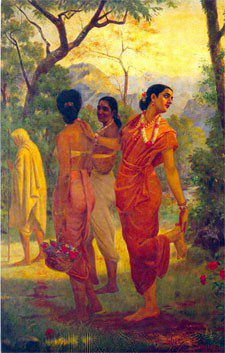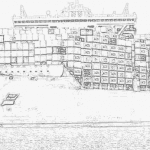Kalidasa, the greatest poet of old India, became known in Europe in the last decade of the 18th century. At that time the English colonial rulers set up a centralised tax, law and administrative apparatus in the areas controlled by the East India Company which they had won since 1700 in their wars against the indian princes and against the French who had previously been in control. These areas covered more than half of all India, and all higher offices were occupied by Enghshmen.*2
Sir William Jones, a cultured man and representative of the enlightened bourgeoisie, took over the post of judge in the Supreme Court of Bengal in 1783. In 1789, just at the outbreak of the French Revolution, Sir William published.Kalidasa’s drama “Sakuntala” in an English prose translation, and thus demonstrated to an astonished Europe  that old India had known the drama, the stage play. He called Kalidasa the Indian Shakespeare—a somewhat lame comparison, nevertheless.
that old India had known the drama, the stage play. He called Kalidasa the Indian Shakespeare—a somewhat lame comparison, nevertheless.
But in 1791, as the Jacobins-the revolutionary democrats-began to extend the revolution against the big landowners and the big bourgeoisie in France, Georg Forster, the Mainz Jacobin, produced his German prose translation of Jones’ English version of “Sakuntala”.
He sent a copy to Goethe, who was so enthusiastic about the drama that he sang its praises in two couplets:
If in one word of blooms of early and fruits of riper years,
Of excitement and enchantment I should tell,
Of fulfillment and content, of Heaven and Earth;
Then will l but say “Sakuntala” and have said all.
Goethe had the lines printed in the “Deufsche Monatsschrift” (German Monthly Journal) as early as 1791, and in the following year Herder, who was also living in Weimar at that time, set them at the head of his article “On the Eastern Drama”. He mentioned Sakuntala again in 1798: “since Sakuntala is unfortunately still the only example of her (India’s) perfected culture, one lingers with pleasure over it. We must have more Sakontalas in the near future, for they are the finest contributions to the cultural history of the peoples”. (*6)
Only five years later, in 1803, Herder published Forster’s translation of the drama again and added a short dedication in which he gave renewed expression to his admiration for Kalidasa. Friedrich Schlegel came to know Forster’s first edition at the Leipzig Fair ns soon as it appeared, and he wrote to his brother about this remarkable work. He went later to Paris to learn Sanskrit and thereafter introduced the study of indology into Germany.
These few facts indicate how right Goethe was when he wrote later: “Recalling the enthusiasm with which we Germans welcomed this translation of Sakontala we can attribute the pleasure it gave us to the prose in which it came to us”.
Forster’s work had a very considerable influence on German middleclass society.
Friedrich Rueckert translated the drama into German again in 1S55—this time direct from the Sanskrit—but his version was only published in 1867, after his death.
The publication of Heinrich Heine’s posthumous works in 1869 brought to light that Heine had noticed something very important about our drama. In the chapter entitled “Thoughts and Ideas” he wrote: “Goethe made use of Sakuntala at the beginning of Faust”*“; here he means that Goethe conceived the idea oi the “Vorspiel auf dem Theater” in Faust from the prologue to “Sakuntala”, In “Sakuntala” an actor appears first on the stage and speaks a prayer to Siva, for Indian drama is deeply rooted in the religious ceremony which used to fill several hours of the day and night. Then the stage director comes on, calls the leading actress and informs her that Kalidisa’s drama “Sakuntala” is to be performed before s cultured audience, so that the actors must do their utmost.
“Madam, I tell you plainly that I value our theatrical talent only in so far as an enlightened audience derives pleasure from it. But I am filled with doubts of my own powers, however great my efforts.” The stage director then calls on the leading actress to sing a strophe in praise of the prevailing summer season, and the play can begin.
Goethe’s prologue takes the following course: the director comes out on the stage with the theatre poet and the comedian and asks both for their help. He is embarrassed, for his public is frighteningly well read. The poet refuses at first to hear anything of the people and thinks only of posterity. The comedian will hear nothing of posterity and wants only to amuse contemporaries. The director wants to produce an impressive spectacle.
“Plunge into the fullness of life”, the comedian advises the poet; “everybody lives it, but few know it. And wherever you seize upon it, it is interesting.”
The poet speaks of “the urge towards truth and the joy of deceiving”. The three thus discourse on the deepest problems of art in witty dialogue, quite unlike Kalidasa, who has only followed the old Indian custom in composing at short prologue which introduces the audience to the poet and the title of the play, since there were no theatre programmes. He takes this opportunity to flatter his audience, which was not composed of a crowd of people looking for entertainment, night after night, in professional theatres, as they were accustomed to do in Goethe’s Weimar, but of a small group of gentlemen, nobles and Brahmans, higher officials, perhaps a few wealthy merchants, who gathered on some festive occasion in a comparatively small theatre or hall at the king’s court to he entertained. The mass of the people did not even understand the language of the play— Sanskrit. Thus the two prologues are very different, indicating two different kinds of society, each with different expectations of the theatre. But we have to thank the Indian poet for inspiring Goethe to this gem of his art.
Goethe also became acquainted with Kalidasa’s lyric poem “Meghaduta”, the Cloud Messenger, from H. H. Wilson`s translation into English. In 1811 Wilson was appointed First secretary to the newly founded Asiatic Society in Bengal, and in 1813 he published his first work in Calcutta, the text and translation of the “‘Cloud Messenger”. In this poem a spirit ‘banned from the spirit world, sends a message through a cloud to his beloved in his homeland. Goethe wrote one of his “tame epigrams” on this:
“What more pleasant could man wish ?
Sakontala, Nala, these must one kiss;
And Megha-Duta, the cloud messenger,
Who would not send him to a soul sister!”
In his “Notes to the West-East Divan” he owns that: “The first meeting with a work such as this is always an event in our lives”. But he also criticised Wilson’s translation as too smooth and praised “unseren Kosegarten”, who had translated a few verses from the original for him, “which assuredly gave quite a different impression”. But in 1826 Wilhelm von Humboldt praised this poem of old India for its wonderful description of the beginning of the rainy season, when the first clouds come up from the South. After C. Schuetz published the first prose translation of the poem in 1859 in Bielefeld, a number of others followed, some of them in verse“.
In 1827 Wilson’s English translation of Kalidasa’s drama “Urvasi won by Valour” and a short summary of his third drama “Malavika and Agnimitra” became known in Europe. ” Malavika and Agnimitra” was first available to educated Germans through A. Weber’s excellent German translations in 1856. Since Wilson’s time scholars had doubted the genuineness of this drama and had neglected it until this great Berlin indologist placed it in its proper light. No less a man than Lion Feuchtwanger prepared it for the German stage in 1917 under the title of “The King and the Dancer”.
The Urvasi play had been published as early as 1814 by Bollensen in a German translation, Rueckert had only included a few translated Verses in his summary of 1834”. In 1833 Rueckert had also translated a few verses from Kalidasa’s epic poem, “The Line of Raghu”—the section containing Aja’s mourning for his dead wife Indumati. A free metric translation of this work into German by A. F. von Schack appeared in 1890 and in prose by 0.Walter in 1914.
Kalidasa’s sixth work, “The Birth of the War God”, an epic poem, was translated by Griffith into English in 1879 and by 0, Walter into German prose in 1913 (*21).
Thus it took over a hundred years for all six of Kalidasa’s works which have survived to reach us Germans in translations. Only in 1921 did the well-known indologist A. Hillebrandt first publish his work, “Kalidasa An Attempt at a Literary Appraisal”, in Breslau. He deals with the times, works and art of the poet in 166 pages and comes to the conclusion that “Kalidasa can never approach the popularity of our ancient classics amongst us”. Indian Literature is “too far removed from our sensitivity to compete with Homer or with the poet of the Antigone, or to hold permanently the interest of educated persons in the way Shakespeare or Dante does …. We find too little manly strength, too little dramatic élan, too little inner struggle and revolt against fate… We demand deeper problems. Nevertheless, there is so much genuine and undying poetry in Kalidasa’s works that it is well worth the effort to make it available to people who will not be discouraged by certain outward characteristics.
We are thankful for Hillebrandt’s scholarly work, but can nevertheless not accept his judgment. The Germany of today is not the Germany of 1921. Hillebrandt then wrote for a narrow circle of educated persons who were searching for a way out of Germany’s post-war misery to the treasures of world literature, (His book was written in 1918.) Today our working people are inspired by humanism, internationalism and love for all peoples of the cultures to acquaint themselves with the works of the masters of international literature. 0ur· people want to know where friendly hearts beat and are still beating amongst the people of other lands. Just as we are proud of our own cultural heritage, and seek to make it our own, so we want to share the joy of other peoples in their past and present achievements. We shall not demand “revolt against fate” etc. from this old Indian classical poet. We went to learn what he meant to the Indian people. We realise that his works can give us today every great deal as they stand. We try to understand him in his own background, and we find that he really was, as Goethe and Herder said, a great poet who loved his fellowmen and understood how to picture their passions, joys and sorrows vividly, and that he had a sharply critical and observant attitude towards the weaknesses of the ruling circles of his time. His speech is a weapon to capture the attention of his listeners, although this is not so easy to see from existing translations. He has the fantasy of the true poet who can hold his hearers and readers into his ban. And he has greet humanity, so that one, is eager to enter into his ban, for he can be gay and earnest and always reflects the world as it was.
Kalidasa‘s world is strange to Europeans et first, of course. But research can help us to understand this world. Once through the strange outer boundaries, we quickly find the general human content within, Indians are different from Germans, people who lived during the early days of feudalism are different from people engaged in building the bases of socialism. But man is man, whatever the colour of his skin.
How poor we would remain if we confined ourselves to our own German or European culture. Forster, the Jacobin, wrote in his introduction in 1791; “Every country has its peculiarities, which influence the spiritual powers and the organisations of its people. If we compare these varying individualities and separate the general from the local, we shall arrive at the right understanding of mankind …,Here an entirely new vista opens up before our feelings and our imagination; an extraordinarily beautiful individuality of the human character. , .. It is necessary to set out clearly how the differences between Indian mythology, history and customs and the Greek, for instance, lend the art works of that country an unusual form and appearance to us, but also to show how the significant thing about such works is riot whether they consist of five or seven scenes, but that the most delicate feelings which the human heart can sense can be just as finely expressed on the Ganges by dark brown people as on the Rhine, the Tiber or the Illissus by our white races”.
2. The Life and Times of Kalidasa
We know almost nothing- at least nothing certain—about the life and times of the great Kalidasa. Various anecdotes, whose truth we cannot yet determine, are told in India. Kalidasa is said to have been a Brahman who was early orphaned and grew up in poverty as a cow-herd. At that time a King of Benares wished to marry his daughter to ‘a famous grammarian named Varuruci, but the Princess considered herself too learned for this scholar, Vararuci, thus scorned, met the handsome young cowherd by chance as he sat on a branch and began to saw it off. He brought this poor, handsome and stupid boy to the Princess after impressing upon him that he must remain silent, So he stuttered only an odd word as he stood before the King, and Vararuci cleverly interpreted it as a wise saying. The youth gave no answer to questions asked by the Princess, and Vararuci explained that he was above answering questions put by a girl. The youth was then married to the Princess, who soon discovered the deception. But the stupid youth paid tribute of flowers to the great goddess Kali until she rewarded him with a knowledge of grammar, logic and poetics”‘—the three branches of learning needed by a poet to help him write correctly, logically and poetically. The youth took the name of Kalidasa, “Slave of Kali””, as an expression of his gratitude.
Kalidasa is said to have been an ornament of the mythical King Vikrama’s court in the city of Ujjain. One day a poor Brahman came to the court; he wished to greet the king with the customary verse—”May threefold happiness be yours” etc. But unfortunately he used the word meaning “embarrassment” instead of “happiness” by mistake. Kalidasa sprang up and completed the verse quickly: “May three-fold embarrassment be yours. May Brahmans embarrass you with their attentiveness at court, your sons at table and your wife in bed”, Thus Kalidasa had become as versed as his mentor- Vararuci; the attentiveness of Brahmans, his sons and his wife could not fail to please the King.








Leave a Reply